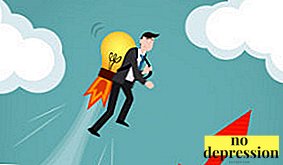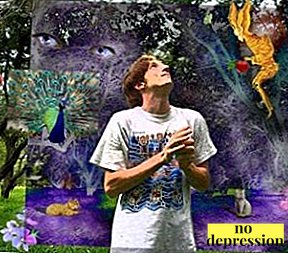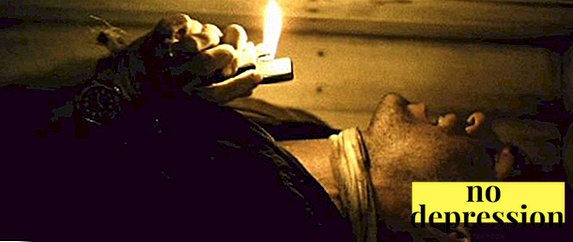Every person is constantly experiencing emotions and feelings.
In other words, he is in a certain emotional state and he has various emotional processes.
The simplest emotions have congenital character but man learns to control them as a result of education, acquired volitional qualities. Therefore, emotions become higher intellectual processes.
Emotions as a mental process

Emotion - this is the state of the individual, reflecting his attitude to the events around him.
Emotion occurs as a result of external and internal stimuli.
Emotions manifest in two forms: expressive and impressive. In the first case, external expressions are meant: facial expressions, gestures, intonation, speech.
In the second - internal: breathing, pressure, heartbeat. Psychologists talk about the dual nature of emotions as a mental process, that is, there is a physiological and psychological side.
The author of the model of opponent emotional processes, William James, created his theory, which was the basis for further study of emotional processes and states.
The emotional side has great value for the development of man as a person. Inner experiences help to better understand the world around us, empathize with other people, express their feelings, and build relationships.
The more developed the subject and the higher on the evolutionary ladder he is, the richer his emotions and the more difficult the emotional processes take place.
The very first and elementary emotion that any living creature experiences is satisfaction from physiological needs and the displeasure of not being able to satisfy them.
Classification

Emotional-mental processes are called processes that regulate the internal human activity.
They reflect the significance of the events for the individual, regulate his behavior and perception.
These processes have a psychological and physiological component. For example, a person experiences fear, which means that the situation is dangerous for the subject.
At the same time, a series of physiological processes: adrenaline is released, there is a rush of blood to the muscles, pressure increases.
Thus, the body is prepared to avoid danger or overcome it.
What applies to them? The most correct, adopted by domestic psychology, is the following classification of emotional processes:
- Affect. Short-term process, pronounced sharp motor manifestations and changes in the body. Affects are rapid, violent, emotional processes.
- Emotion. Less intense and longer than affect. Reflects the value of the situation for the subject, and not the relation to a particular object. For example, an alarm condition.
- Feeling. It lasts even longer than emotions, reflects the attitude of a person to a specific subject. For example, a feeling of love or hostility. Feelings are the most lasting and sustained emotional processes.
- Mood. This process is quite long, but low intensive. For example, the feeling of loneliness, boredom.
Kinds

Emotional processes can be divided into the following types:
- Emotional (affect, emotion, feeling). They are a reflection of the attitude of the individual to the external environment and their own experiences.
- Cognitive (perception, memory, imagination, thinking, sensation, speech). They contribute to the acquisition, preservation and reproduction of information received from outside. Thanks to them, the subject can plan their actions in advance, calculate the course of events and the result, manage them.
- Willful (goal definition, motivation fight, search and decision making). Emotional-volitional processes in psychology reflect the ability of an individual to resist and overcome obstacles.
Without will, it is impossible to achieve goals, work planning, etc. These processes are closely related to cognitive and emotional ones.
Thus, with the help of intellect, a person launches the will, imbues it with emotions and guides it with the help of imagination.
Causes
Emotional processes don't arise by themselves. They are the result of external stimuli or processes that occur inside the body. In humans, emotions are manifested for the following reasons:
- Innate ability react to some factors, that is, unconditioned stimuli.
- Certain factors became significant for the individual, so they got the ability to evoke emotions.
- Situations and irritants contradict the acquired experience, therefore provoke the beginning of the emotional process. Depending on the experience gained, the emotional process can be positively colored or negatively colored.

From the point of view of physiology, the emotional process is the result of certain actions in the nervous system. Some emotions arise during the stimulation of neurons, others - with a steady state of neurons.
Also emotions are caused by individual internal processes person:
- memory;
- by imagination;
- thinking;
- nerve impulses from human motor activity;
- the activity of the endocrine glands.
Psychological protection

Psychological protection - These are deep-seated processes occurring at an unconscious level, aimed at reducing negative emotions.
Protection target - reducing the internal conflict between the unconscious (innate) and acquired (the requirements of the external situation).
If this conflict is weakened, a person can adapt to existing circumstances, feel and behave more balancedly.
Protection mechanisms are divided into two types:
- primitive. The person simply tries to prevent the negative situation from entering the consciousness;
- more mature. The situation is allowed, but distorted.
The main types of psychological protection:
- Negation. Based on the principle: "If I do not accept it, then this does not exist." That denial is the first reaction to the death of a loved one. Sometimes denial brings a positive effect. For example, a person is mortally ill, but does not recognize it and continues to be treated.
But in most cases, denial is destructive. So an alcoholic or drug addict deny their addiction.
- crowding out. A person strikes out unpleasant moments from consciousness. An event that was the beginning of a depression can be supplanted. Also, an individual can cross out his thoughts and desires that do not meet the standards of social behavior. It is impossible to completely eliminate something from the psyche, it will ultimately manifest itself in the form of emotions, nightmares, inadequate reactions.
- Substitution. This is a transfer of negative emotions to another channel, their removal on other objects. For example, after work, a person shouts at family members, because he had a hard day. The guy after the conflict with the girl breaks the phone, beats a punching bag.
- Rationalization. Associated with the desire to justify their feelings and actions. For example, betrayal of a loved one is justified by lack of attention, unwillingness to communicate - negative qualities of the opponent, although this is not true. Rationalization is the main mechanism of self-defense, which often leads to self-deception.
- Discredit. You can discredit the goal itself as well as another person. In the first case, the mechanism "if I can not get it, it is bad." In the second, negative traits are attributed to another person. For example: "He would do the same."
- Projection. It is that their own negative traits are projected onto another person. For example, a person is prone to constant lies, but blames others for this. Initially, the projection is laid back in childhood, when the baby does not separate itself from others.
At a more adult age, such people often take the position of the victim, blaming anyone for their failures, but not themselves.
- Somatization. The individual pretends to be sick in order to achieve his goal. The simplest example: a child does not want to go to school and simulates an attack of intestinal colic.
- Reactivation. Manifested in the opposite reaction. Personality hides the true motives of their behavior. So unrequited love turns into hatred for the object of feeling, the envious person flirts and fawns before the one who envies, although he hates this person in his heart.
- Regression. Return to a lower level of development. Often manifested in children who were weaned from their parents. They stop walking, talk, they have enuresis.
- Insulation. The personality begins to discuss the traumatic situation with detachment, as if this did not happen to him.
- Intellectualization. The desire to avoid unpleasant experiences by intellectual analysis of the situation.
The person looks cold and indifferent, as if what happened does not concern him.
- Compensation. A person seeks to get rid of negative qualities due to the development of others.
- Passive or overt protest. The person refuses to communicate with others, does not respond to their requests. Often manifested in adolescents.
- Identification. Also characteristic of adolescents who identify themselves with their idols and tend to behave like they are. Also, some put themselves in the place of another, justifying his behavior ("Stockholm syndrome").
- Self limitation. It is expressed in avoiding a re-encounter with a situation that causes unpleasant emotions. So a person who has survived a painful separation will avoid close contact with the opposite sex.
- Cancel action. It is expressed in the commission of deeds, which, as it were, annul the previous negative deed. For example, a person asks for forgiveness and thus gets rid of feelings of guilt.



Vygotsky's theory
The famous psychologist L.S.Vygotsky advanced the theory of the synthesis of intellectual and emotional processes. They differ only in the fact that a person cannot control the lower intellectual processes, and the higher ones can be regulated by will.
This management is promoted by higher mental functions that should be developed from early childhood. An important role in the development of higher functions is played by the social environment.
It is she who determines the course of human development at all age stages. Before the baby opens “Zone of proximal development”, that is, those tasks with which he can cope only with the help of adults.

Without emotion it is difficult to imagine a normal human life.
Emotional processes and states play a big role in its development.
They motivate him, protect him from thoughtless actions, help him better understand the world around him.
Psychological protection protects the mind of the individual from various traumatic situations.
About the emotional processes in this video:



